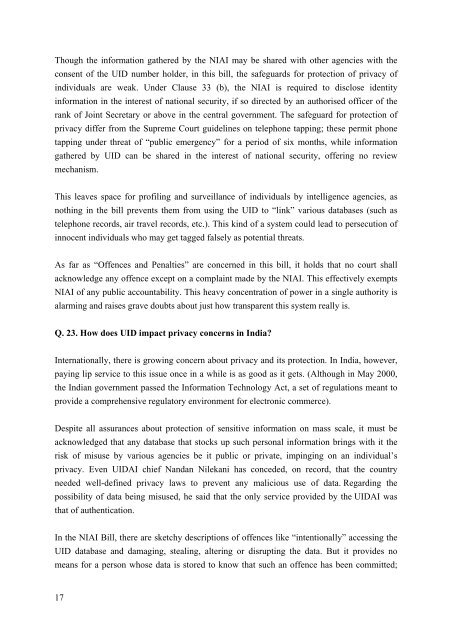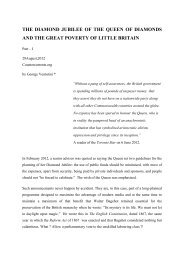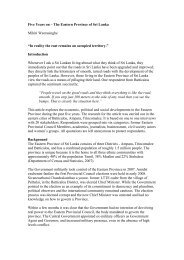UID For Dummies (PDF) - Countercurrents.org
UID For Dummies (PDF) - Countercurrents.org
UID For Dummies (PDF) - Countercurrents.org
You also want an ePaper? Increase the reach of your titles
YUMPU automatically turns print PDFs into web optimized ePapers that Google loves.
Though the information gathered by the NIAI may be shared with other agencies with the<br />
consent of the <strong>UID</strong> number holder, in this bill, the safeguards for protection of privacy of<br />
individuals are weak. Under Clause 33 (b), the NIAI is required to disclose identity<br />
information in the interest of national security, if so directed by an authorised officer of the<br />
rank of Joint Secretary or above in the central government. The safeguard for protection of<br />
privacy differ from the Supreme Court guidelines on telephone tapping; these permit phone<br />
tapping under threat of “public emergency” for a period of six months, while information<br />
gathered by <strong>UID</strong> can be shared in the interest of national security, offering no review<br />
mechanism.<br />
This leaves space for profiling and surveillance of individuals by intelligence agencies, as<br />
nothing in the bill prevents them from using the <strong>UID</strong> to “link” various databases (such as<br />
telephone records, air travel records, etc.). This kind of a system could lead to persecution of<br />
innocent individuals who may get tagged falsely as potential threats.<br />
As far as “Offences and Penalties” are concerned in this bill, it holds that no court shall<br />
acknowledge any offence except on a complaint made by the NIAI. This effectively exempts<br />
NIAI of any public accountability. This heavy concentration of power in a single authority is<br />
alarming and raises grave doubts about just how transparent this system really is.<br />
Q. 23. How does <strong>UID</strong> impact privacy concerns in India?<br />
Internationally, there is growing concern about privacy and its protection. In India, however,<br />
paying lip service to this issue once in a while is as good as it gets. (Although in May 2000,<br />
the Indian government passed the Information Technology Act, a set of regulations meant to<br />
provide a comprehensive regulatory environment for electronic commerce).<br />
Despite all assurances about protection of sensitive information on mass scale, it must be<br />
acknowledged that any database that stocks up such personal information brings with it the<br />
risk of misuse by various agencies be it public or private, impinging on an individual’s<br />
privacy. Even <strong>UID</strong>AI chief Nandan Nilekani has conceded, on record, that the country<br />
needed well-defined privacy laws to prevent any malicious use of data. Regarding the<br />
possibility of data being misused, he said that the only service provided by the <strong>UID</strong>AI was<br />
that of authentication.<br />
In the NIAI Bill, there are sketchy descriptions of offences like “intentionally” accessing the<br />
<strong>UID</strong> database and damaging, stealing, altering or disrupting the data. But it provides no<br />
means for a person whose data is stored to know that such an offence has been committed;<br />
17










